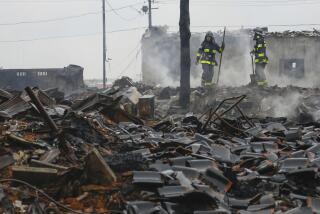Some See God’s Hand in Remade Landscape
TALPE, Sri Lanka — At the moment he was running out of air, trapped underwater with his head held down by a slab of concrete and his body repeatedly slammed by the surging tsunami, Evan Russell Kern called to Jesus to save him.
His appeal, the born-again Christian said, was answered almost immediately: The concrete broke apart, and he reached the surface.
Here in nearby Talpe, the Starlight Inn hotel suffered only minor damage -- mud on the veranda and a few branches in the dining room. Structures for miles around were devastated.
Owner Ginthota Polwattage Susil Asoka, a Buddhist, attributes the near-miracle to the good karma he has built up over a decade of charity work.
“Before, people weren’t sure there’s a God, but now they are,” said Mohammed Nazar, a Muslim businessman in the town of Galle. “God has brought great floods as a warning. Whether you’re a Buddhist, a Christian or a Muslim, this is a sign to live according to your religion.”
Even as global news networks detail the science behind the Dec. 26 earthquake and tsunami using multicolored graphics and detailed timelines, many Sri Lankans who lived through this catastrophe see the work of a force far greater than some powerful waves.
Frequently heard at devastation zones are the echoes of an Old Testament-style God who rewards the deserving and smites the unworthy, lashing out at corrupt rulers and punishing those who have abused nature in their headlong rush for wealth.
“Buddhists believe it’s very important to keep a balance,” Asoka said. “Nowadays, so many hotels in Sri Lanka pollute and dump garbage into the sea, so the sea is taking its revenge.”
Even those whose belief in religion has waned admit their brush with this much raw power, which killed more than 30,000 people in Sri Lanka alone, has forced them to reexamine their view of faith and spirituality. New Zealand tourist Simone Grace, 32, said that as she fought for her life in a swirl of glass, knives and blunt objects after the waves roared through her hotel in Unawatuna that morning, she found herself engaged in a profound internal debate.
“In those 10 seconds facing death, I really thought hard about whether I should or shouldn’t revert to religion,” said Grace, a lapsed Roman Catholic, as she sat beside a stone statue of the Hindu god Ganesh.
Grace, who works in costume and film production in London, said she decided against a last-minute conversion, though the disaster had left her mulling weighty questions about death, life and her place in it all.
Organized religion provides solace to many, she noted. Still, she’d rather not be part of something that can divide people and engender intolerance.
“I’d just say I believe in a universal force,” she added.
Malskaer Lispegh, a 47-year-old Danish resident of Unawatuna who ran a motorcycle rental business before the tsunami washed away all the bikes, said she had felt more vulnerable since surviving the waves by climbing on a rooftop and pulling her 12-year-old son to safety by his long hair.
“I’ve started to think, what’s wrong with our global system, and why has so much pain fallen down on Sri Lanka?” she said in a friend’s washed-out living room. “While I’m not a member of any organized religion, I find myself praying to something out there for help.”
All that’s a bit too ethereal for many Sri Lankans, who live in a society in which people are generally known by their religion, and the local temple, mosque or church tends to be the heart of their community.
Many locals’ faith has been redoubled by what they view as evidence that the waves seemed selective in their destruction, sparing most religious buildings and icons. While structural engineers argue that religious buildings are typically bigger and better able to withstand a tsunami’s fearsome power than ordinary houses, others here insist their survival in apparently great numbers is God’s handiwork.
In Galle, concrete and plaster statues of Buddha, legs folded and expression serene, sit with barely a scratch amid piles of rubble. In Mullaittivu, statues of saints remain on the parapet of an otherwise destroyed seaside Catholic church. In Talpe, although the glass case around it has shattered, a 7-foot, orange Buddha at the Meegaha Dewalaya Temple appears untouched.
“Every place we go, the Buddhist statues are without damage,” said Lionel Eerasinghe, a coordinator with the Sri Lanka Foundation, a civic group. “People believe they have special protection.”
Many temples, mosques and churches have reported a surge in attendance. At the Kataguda Jumma mosque in Dewata near Galle, the number of people who attended prayers on the Friday after the tsunami swelled 30% to 2,000, said Imran Uwais, a teacher there.
“We don’t have enough room,” he said. “The wave is a curse, and people are getting the message, at least for now.”
Asoka, the businessman, said Sri Lanka must take collective responsibility for what’s happened. The country was once known as the Pearl of the Indian Ocean for its prosperity and sophistication. Recently, he said, it has lost heaven’s mandate because of its corrupt leaders and greedy citizens.
“It’s a warning to people to behave themselves,” he said.
More to Read
Sign up for Essential California
The most important California stories and recommendations in your inbox every morning.
You may occasionally receive promotional content from the Los Angeles Times.










